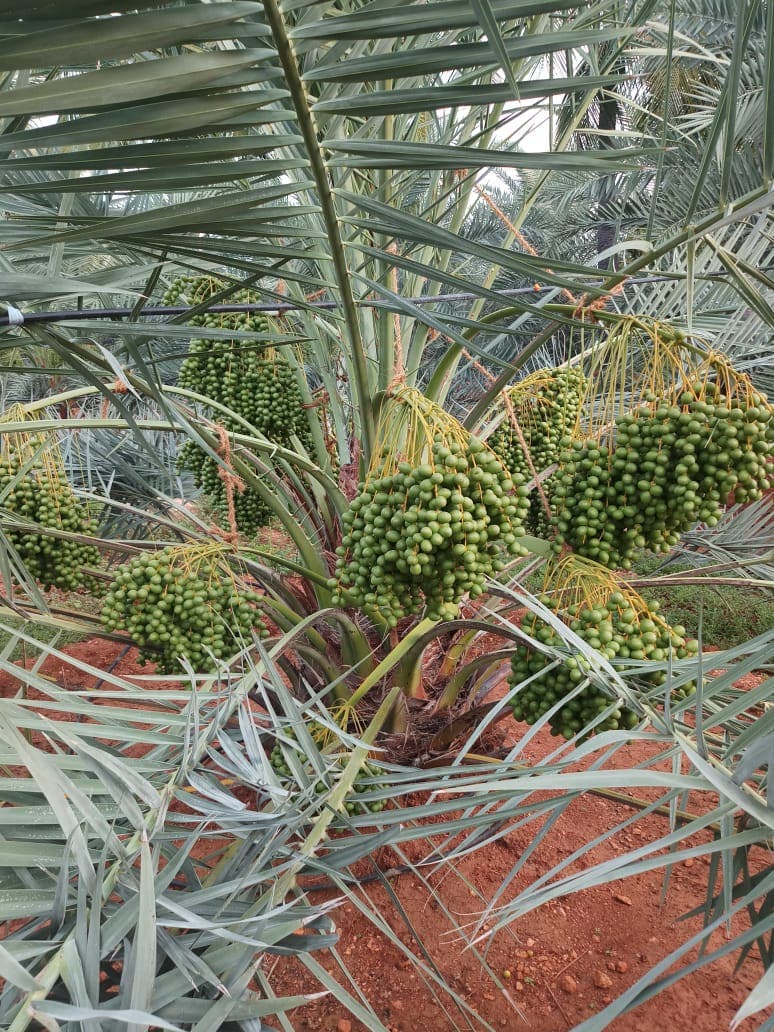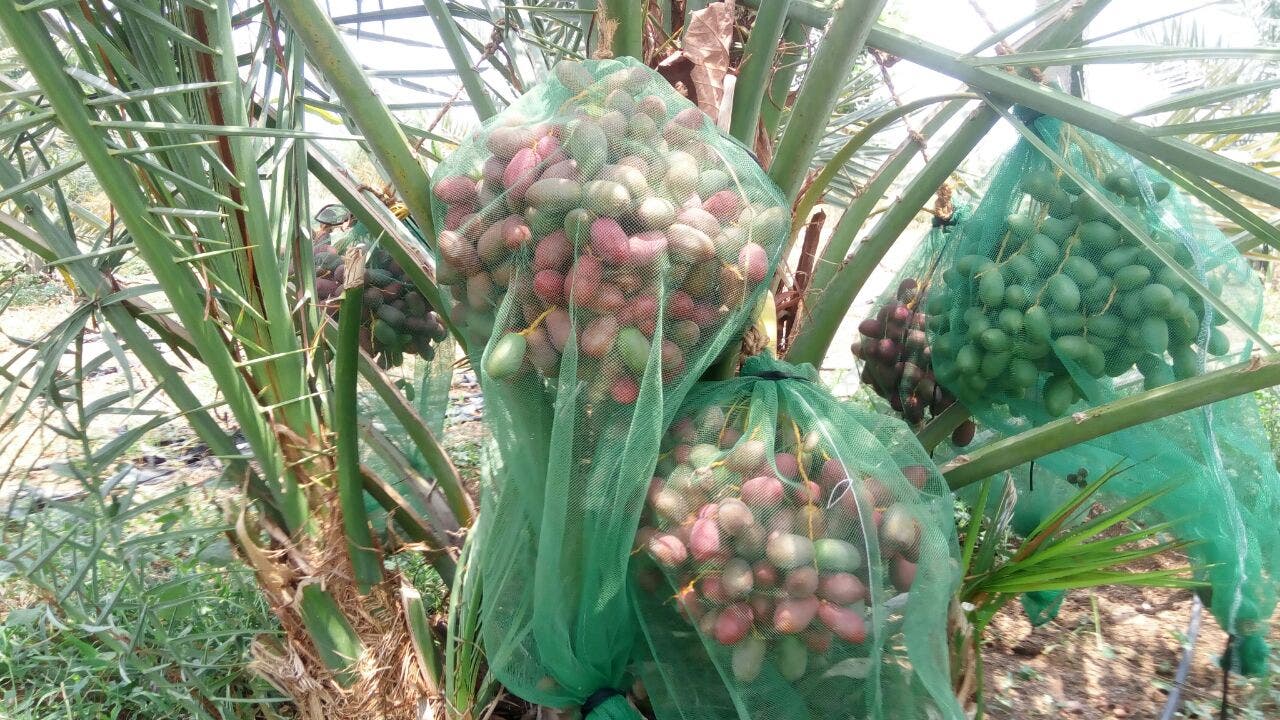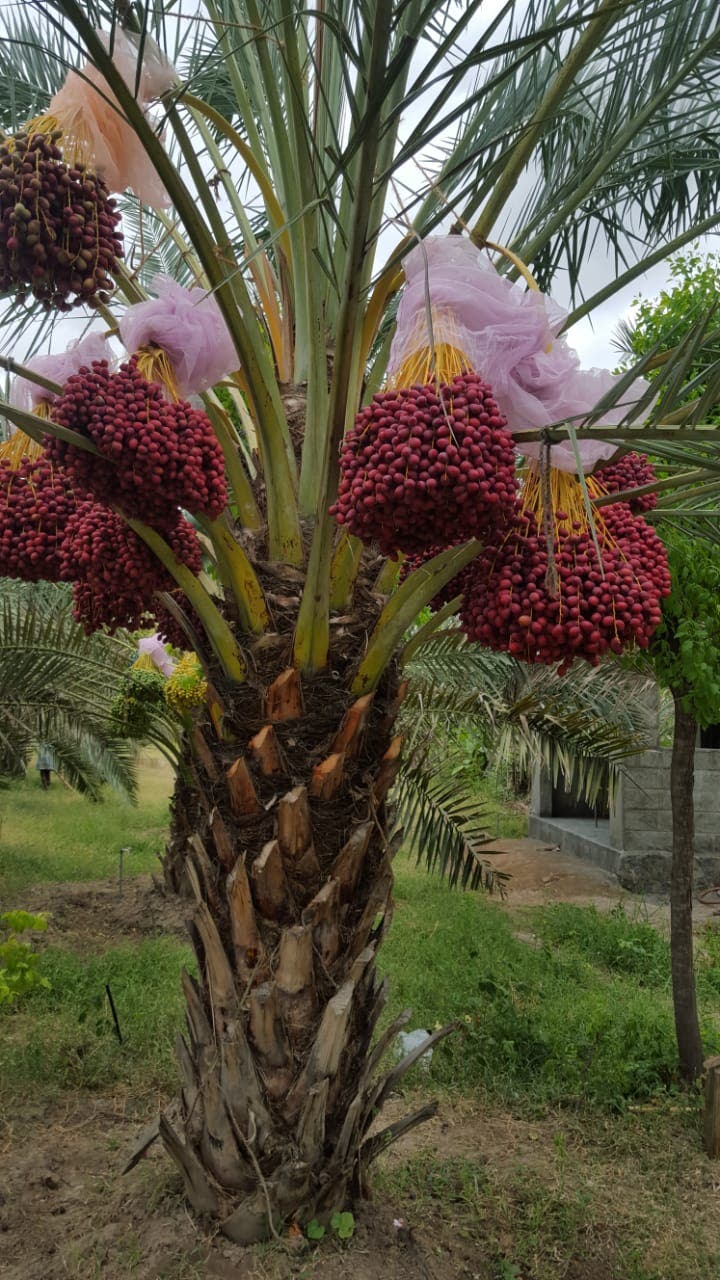In India there is a presumption that good, juicy dates are procured only in the Gulf Cooperation Council (GCC) countries. Little do we know that similar quality dates can be grown in India too.
Though the Kutch region in Gujarat, Punjab and Rajasthan are two major date-growing states, with Gujarat alone home to 2 million date palm trees, Tamil Nadu in south India is fast catching up.
Despite India being the one of the largest importers of dates in the world – around 3.5 million metric tons every year – there is good market for homegrown dates both locally and abroad.
Farm-cum-nursery

Meet Nizamuddin S., who cultivates 32 varieties of the luscious fruit as well as date palms. His farm-cum-nursery at Ariyakulam in Dharmapuri district in western part of Tamil Nadu literally bears fruits of hard labor and innovation.
The dangling cluster of dates on date palms at his farm are feast for the eyes. Owner of Saliah Dates, Nizamuddin got the idea of cultivating dates while working in Saudi Arabia.
Finest Saudi dates

Responding to emails from Al Arabiya English, Nizamuddin said: “Saudi Arabia has the finest dates in the world. One fine day I thought why such dates cannot be grown in India? It seemed possible and I bought 100 plants for testing and the idea blossomed”.
There has been no looking back since then as his nursery-cum-farm now has more than 32 varieties of date palms. One of them is the Barhee dates, which costs Rs. 300 per kilogram. Barhee is the best variety and yields more than 200kg per plant.”
Tamil Nadu is an important state for dates in southern India. Here climate, soil and irrigation facilities in some coastal regions like Tirunelveli, Tuticorin and Ramanathpuram districts favor date palm cultivation.
Tissue culture technology

Over decades of cultivation practices followed in different regions, regenerating dates either by seeds or offshoots and trying different imported cultivars, have led to the present date fruits of great variations in size, shape, color, weight, taste and astringency.
Moreover, controlling date palm diseases using methods, which do not pollute soil, plant and products, has not been easy.
The obvious solution was to produce date palms by adopting tissue culture technology, which enables farmers to select only the best trees as every plant produced from the cut stem is genetically identical to the parent tree.
Transforming technology
Nizamuddin is aware that tissue culture can do wonders to the plantation. So he started to import tissue culture plants from abroad where such technologies have been developed.
“Twenty years ago first we tried seedlings. But there was an issue in the sense that we could not differentiate between a male and female plant. Only the female date palm can bear date fruits. But with tissue culture the plant is 100 percent female and we can get yield by 2 1/2 years”, says Nizamuddin.
“We import such plants from Abu Dhabi and sell all over India. We are soon planning to introduce new varieties. Ajwa dates are our first priority. Depending on how successful the yield is we will go for further new varieties. On the anvil are making different types of food products with dates like date syrup, chocolates, etc.”
courtesy: english.alarabiya.net
Let the Truth be known. If you read VB and like VB, please be a VB Supporter and Help us deliver the Truth to one and all.
New Delhi, Nov 18: The Competition Commission of India (CCI) on Monday imposed a penalty of Rs 213.14 crore on social media major Meta for unfair business ways with respect to WhatsApp privacy policy update done in 2021.
Besides, the competition watchdog has directed Meta to “cease and desist” from anti-competitive practices.
Meta and WhatsApp have also been asked to implement certain behavioural remedies within a defined timeline to address the anti-competition issues, according to a CCI order.
The regulator has called for implementing various remedial measures, including barring WhatsApp from sharing data collected on its platform with other Meta companies or Meta company products for advertising purposes for five years.
Among other directions, CCI has said that sharing of user data collected on WhatsApp with other Meta companies or Meta company products for purposes other than for providing WhatsApp services shall not be made a condition for users to access WhatsApp Service in India.
The Competition Commission of India (Commission) on Monday imposed a penalty of Rs 213.14 crore on Meta for abusing its dominant position,
Passing the order against abuse of dominance, the Competition Commission of India (CCI) said this (penalty) relates to how WhatsApp's 2021 Privacy Policy was implemented and how user data was collected and shared with other Meta companies.
For the case, CCI delineated two relevant markets -- OTT messaging apps through smartphones in India, and online display advertising in India. "Meta Group operating through WhatsApp was found to be dominant in the market for OTT messaging apps through smartphones in India. "Furthermore, it was also found that Meta holds a leading position compared to its competitors in online display advertising in India," CCI said in a release.
Starting from January 2021, WhatsApp notified users about updates to its terms of service and privacy policies.
The in-app notification, effective from February 8, 2021, stated that users were required to accept these terms, including expanded scope of data collection as well as mandatory data sharing with Meta companies, to continue using WhatsApp.
Under the previous privacy policy dated August 25, 2016, WhatsApp users were given the option to decide whether they wanted to share their data with Facebook, the release said.
"However, with the latest policy update in 2021, WhatsApp made data sharing with Meta mandatory for all users, removing the earlier option to opt-out. As a result, users had to accept the new terms, which include data sharing with Meta, in order to continue using the platform," it added.
The watchdog has concluded that the 2021 policy update by WhatsApp on a "take-it-or-leave-it" basis constitutes an imposition of unfair condition under the Competition Act, as it compels all users to accept expanded data collection terms and sharing of data within Meta Group without any opt out.
"Given the network effects and lack of effective alternatives, the 2021 update forces users to comply, undermining their autonomy, and constitutes an abuse of Meta's dominant position. Accordingly, the Commission finds that Meta (through WhatsApp) has contravened Section 4(2)(a)(i) of the Act," it said.
Further, CCI said that sharing of WhatsApp users' data between Meta companies for purposes other than providing WhatsApp Service creates an entry barrier for the rivals of Meta and thus, results in denial of market access in the display advertisement market.
According to the regulator, Meta has engaged in leveraging its dominant position in the OTT messaging apps through smartphones to protect its position in the online display advertising market in contravention of the competition law.
CCI has barred WhatsApp from sharing data collected on its platform with other Meta companies or Meta company products for advertising purposes for five years and the debarment period will start from the date of receipt of this order.
With respect to sharing of WhatsApp user data for purposes other than advertising, the regulator said WhatsApp's policy should include a detailed explanation of the user data shared with other Meta companies or Meta company Products.
"This explanation should specify the purpose of data sharing, linking each type of data to its corresponding purpose," it said.
The watchdog also said that sharing of user data collected on WhatsApp with other Meta companies or Meta company products for purposes other than for providing WhatsApp services shall not be made a condition for users to access WhatsApp Service in India.
Regarding sharing of WhatsApp user data for purposes other than for providing WhatsApp services, CCI said all users in India (including users who have accepted 2021 update) will be provided with the choice to manage such data sharing by way of an opt-out option prominently through an in-app notification.
Also, the regulator has asked for the option to review and modify their choice with respect to such sharing of data through a prominent tab in settings of WhatsApp application, and all future policy updates should comply with these requirements.





